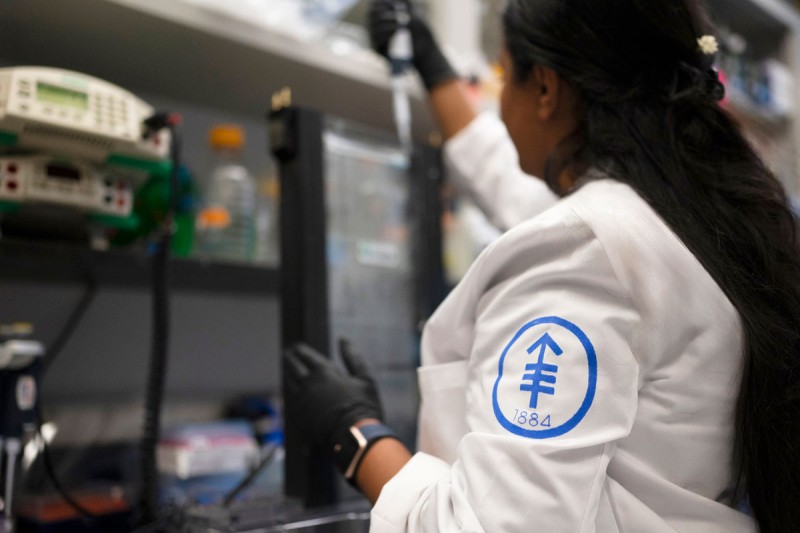
New research from Memorial Sloan Kettering Cancer Center (MSK) and the Sloan Kettering Institute — a hub for basic science and translational research within MSK — suggests a method for revealing DNA repair “scars” could help make treatment decisions in BRCA1- and BRCA2-deficient cancers; modified a bacteria-made compound to target mutant KRAS-driven cancers; and shed new light on brain metastasis in non-small cell lung cancer.
New method for revealing DNA repair “scars” could expand use of targeted therapies
Faulty DNA repair mechanisms can lead to an accumulation of mutations and rearrangements in critical genes that then give rise to cancer. Now, MSK and the New York Genome Center (NYGC) have employed a new method of analyzing DNA sequences from tumors that can reveal the genetic “scars” left by backup DNA repair mechanisms that are specific to BRCA1- and BRCA2-deficient cancers. Mutations in BRCA1 and BRCA2 affect DNA repair mechanisms and are responsible for a significant portion of breast, ovarian, prostate, and pancreatic cancers. A new study — led by Jeremy Setton, MD, and Simon Powell, MD, PhD, of MSK’s Sloan Kettering Institute, and by Marcin Imieliński, MD, PhD, of the NYGC — reveals genetic signatures that hold promise for identifying DNA repair-defective cancers.
The research combined an analysis of short-read whole-genome-sequencing profiles across thousands of tumors with deep linked-read sequencing of BRCA1- or BRCA2-deficient breast cancers, discovering a distinct class of homologous recombination deficiency-enriched rearrangements. “With further validation, this new approach could vastly expand the number of patients who could receive therapies that target the faulty DNA repair mechanisms in their cancer,” Dr. Powell says. “As whole genome sequencing becomes cheaper and more practical, these patterns could become an essential part of therapeutic decision-making.” Read more in Nature.
Targeting KRAS with natural product-based compounds
In recent years, drugs have been approved for treating cancers caused by KRAS-G12C, a common form of the KRAS mutation. But the effectiveness of these drugs, which target only the inactive state of mutant KRAS, is often short-lived. Now a team led by researchers from MSK has taken a cue from nature: Inspired by drugs based on molecules found in plants, fungi, and other living organisms, they identified a compound from Streptomyces bacteria and modified it to target the active state of mutant KRAS, a state that historically has proved very difficult to target by conventional methods.
MSK physician-scientist Piro Lito, MD, PhD, and his laboratory collaborated on the research with the company Revolution Medicines. The drug is derived from a natural product called Sanglifehrin A, which interacts with a multipurpose protein called cyclophilin A. By modifying the shape of the natural product, the team was able to sculpt the surface in a way that it could recognize the active version of mutant KRAS, thus preventing its cancer-causing activity. The drug shrank tumors in lab models of non-small cell lung cancer and colorectal cancer, two cancer types with frequent KRAS mutations. Drugs based on this work are already in two clinical trials at MSK (A Phase 1 Study of RMC-6291 in People with KRAS-Mutated Solid Tumors and A Phase I Study of RMC-6236 in People with Advanced Solid Tumors Containing Specific KRAS Mutations). Read more in Science.
MSK research sheds new light on brain metastasis in non-small cell lung cancer
About half of patients diagnosed with non-small cell lung cancer (NSCLC) will have their cancer spread to their brain. Those who develop brain metastasis face a poor outlook with limited treatment options. To date, a lack of data about NSCLC brain metastasis has hampered efforts to understand its fundamental biology and biomarkers of progression in the central nervous system.
Now, a new study from the labs of MSK’s Luke Pike, MD, DPhil, and Nikolaus Schultz, PhD, and aims to advance knowledge by analyzing similarities and differences in the brain metastases, other metastases and primary tumors of individual patients. The research team found important genetic differences between brain metastases and tumors in other parts of the body, such as higher tumor mutation burden. They also found cell cycle pathway alterations, particularly CDKN2A/B deletions, were more common in brain metastases, and patients who had less common EGFR mutations were more likely to have cancer spread to the fluid spaces of the brain (leptomeningeal disease). Overall, the study’s findings offer a foundation for further investigations into the biology of brain metastasis and potential treatments. Read more in Nature Communications.